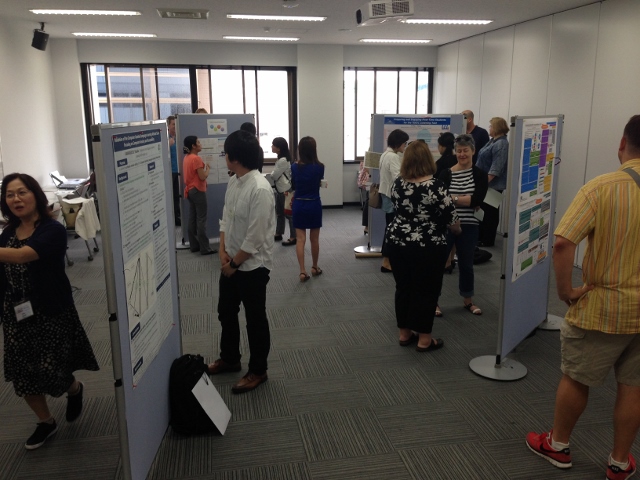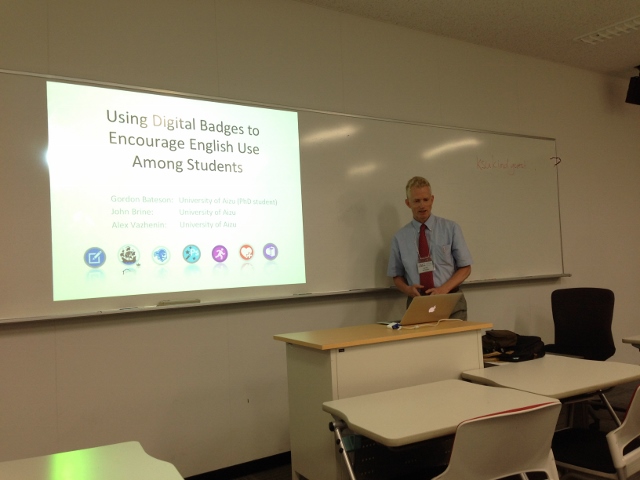|
When and where did the conference take place?
The Japan Association for Language Teaching (JALT) CALL Special
Interest Group's annual conference—JALTCALL 2015—took place 5–7 June
2015 at Kyushu Sangyo University, in Fukuoka, Japan. This was the 22nd
annual JALTCALL conference where teachers, researchers, and commercial
vendors shared research and practical applications in the field of CALL.
Who/what organizations/people were involved?
More than 100 presentations and workshops were offered by an
international array of language teaching professionals. The types of
sessions available to the more than 200 attendees included show and
tell, poster presentations, workshops, and paper presentations, as well
as commercial demonstrations of cutting-edge programs and materials in
the field of EFL education.

The conference was highlighted by a keynote address by Dr. Ema
Ushioda, of the University of Warwick, United Kingdom, titled "Engaging
With Technologies for Language Learning: Perspectives on Autonomy and
Motivation." The plenary address by Rab Patterson of the International
Christian University, Japan, titled "Creativity, Innovation, and 21st
Century Literacies as a Path to Student Academic Autonomy" energized
attendees' efforts in employing state-of-the-art technology in language
learning. Details about the presentations and videos of the keynote and
plenary speeches are available on the conference website.
What were the highlights of the conference?
The conference weekend opened on Friday evening with two
technology workshops about the use of wiki pages for online
intercultural collaborations by the author of this report, and on the
use of digital badges in the gamification of Moodle by Gordon Bateson.
The highlights of the conference presentations included 36 paper
presentations about using CALL methodologies. Examples of the papers
presented included
- Developing Learner Autonomy in Online English
Language Courses,by Maureen Andrade and Ellen
Bunker,
-
Cycles of Reflection: Using Technology in CALL Teacher Education,by Marcia Johnson
-
Scribblenauts: The Principled Adaptation of a Video
Game for Classroom Use,by Stephen Case.
Additionally, the conference offered 32 show and tell sessions, including
- Designing speaking activities using Google's Web Speech API, by Paul Daniels,
- Developing a Digital English Phonetics Course, by Malcolm Swanson, and
- Using Lingt Language for Oral Reports or Speaking
Assignments, by Cathrine-Mette Mork.
The six workshops included
- Integrating Scratch Coding Tasks in a Science and
Engineering University ESL Classroom,by Suwako
Uehara, and
- A Cross-Context Framework for Project-Based English
Using Film,by David Laurence and Ashley Ford.
Finally, the 17 poster sessions included
- Examining Student Attitudes to the Use of
Plagiarism-Detection Software: A Pilot Study at a Japanese
University,by Nick Canning, and
- A Paperless Final Exam With iPads, by Alexander Cameron and Nicholas Bovee.

One of the biggest events of the year is the JALTCALL
Conference Networking Reception. This year's amazing reception was held
under the palm trees on the beach at Luigans. The attendees enjoyed
seeing old friends, sharing thoughts and experiences in CALL, and
meeting new colleagues. It is always a memorable event, and this year's
reception attendees shared robust interactions with one another with
drinks in hand while savoring the fresh ocean breeze.
What about future JALTCALL conferences?
The location of JALTCALL 2016 is still being decided, but this
annual conference is normally held in early or mid-June. Details will be
posted on the JALTCALL Special
Interest Group's website. We hope that more TESOL and CALL-IS
members can join us at JALTCALL 2016 to share their experiences and best
practices in the field of CALL. Questions about the JALTCALL Special
Interest Group or JALTCALL conferences can be directed to me.
Edo Forsythe is an associate professor of English and foreign
language education at Hirosaki Gakuin University, in Hirosaki, Japan. He
is an EdD candidate at Northcentral University with a focus on EFL and
technology in language learning. He has published several articles on
the topic of technology in language learning. |

